Your Comprehensive Guide to Relocating to Ireland with Family: Education, Childcare, and Spousal Support for International Nurses
Making the Move to Ireland a Family Affair
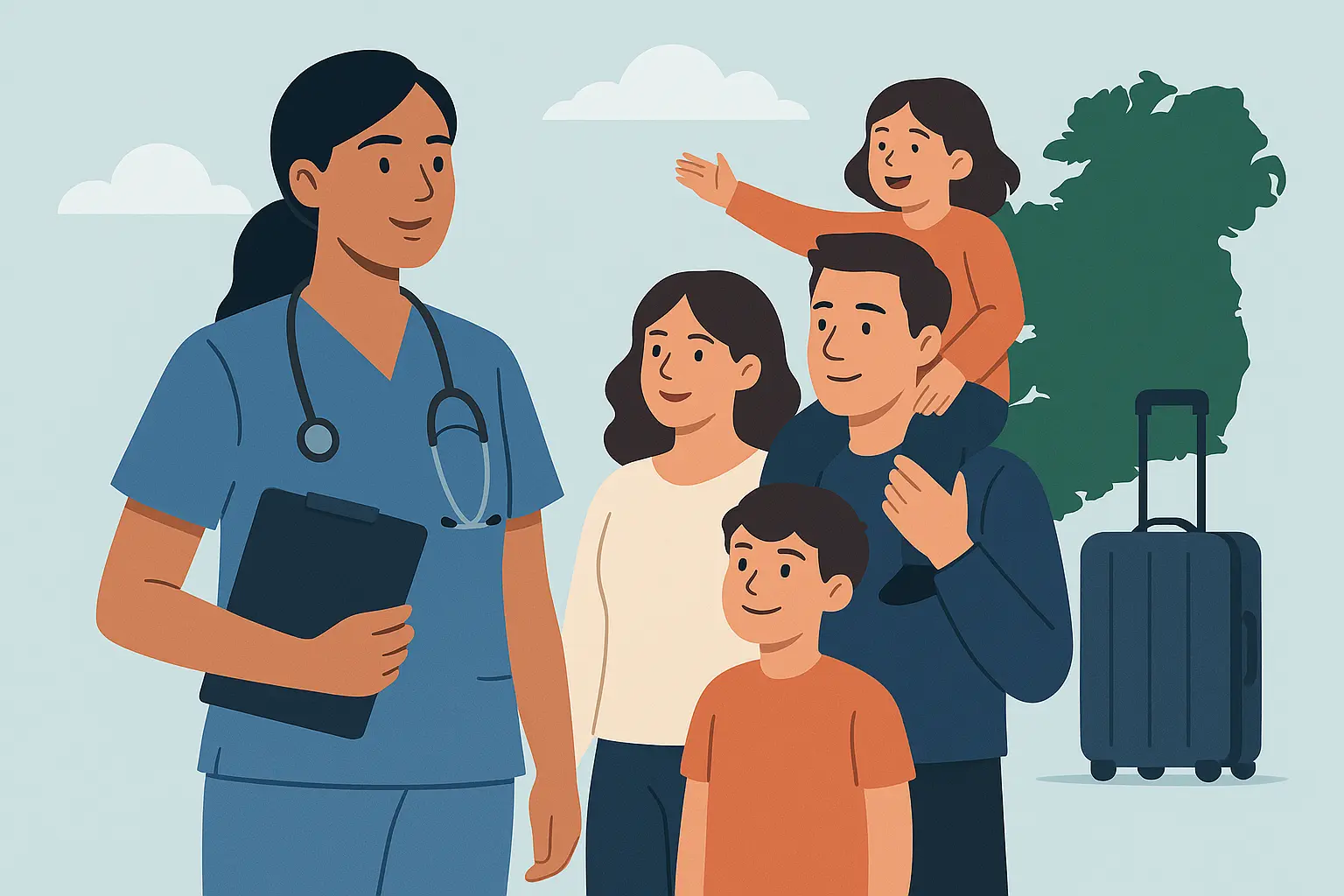
Are you an international nurse dreaming of a vibrant new life in Ireland, but find yourself pondering the intricate details of relocating to Ireland with family? It’s a significant move, and while the professional opportunities are exciting, the logistics of ensuring a smooth transition for your loved ones can feel overwhelming. This is a common concern for many healthcare professionals considering a move to the Emerald Isle.
The process of relocating to Ireland with family brings a unique set of questions. You are not just planning your career move; you are orchestrating a new life for your entire household. This involves navigating an unfamiliar education system, understanding childcare options and costs, and ensuring your spouse or partner can also find fulfilling opportunities. These are not minor details; they are the cornerstones of a happy and successful family life in a new country.
This comprehensive guide is designed to alleviate these concerns. We provide practical, detailed insights into every aspect of relocating to Ireland with family, transforming a potentially stressful process into an exciting new chapter. We will delve into the Irish education system, provide tips for finding schools in Ireland for expats, break down the realities of childcare costs Ireland 2025, and demystify the spouse visa Ireland nurse process. Our goal is to equip you with the knowledge and confidence for a rewarding move for you and your entire family.
Understanding the Irish Education System Explained
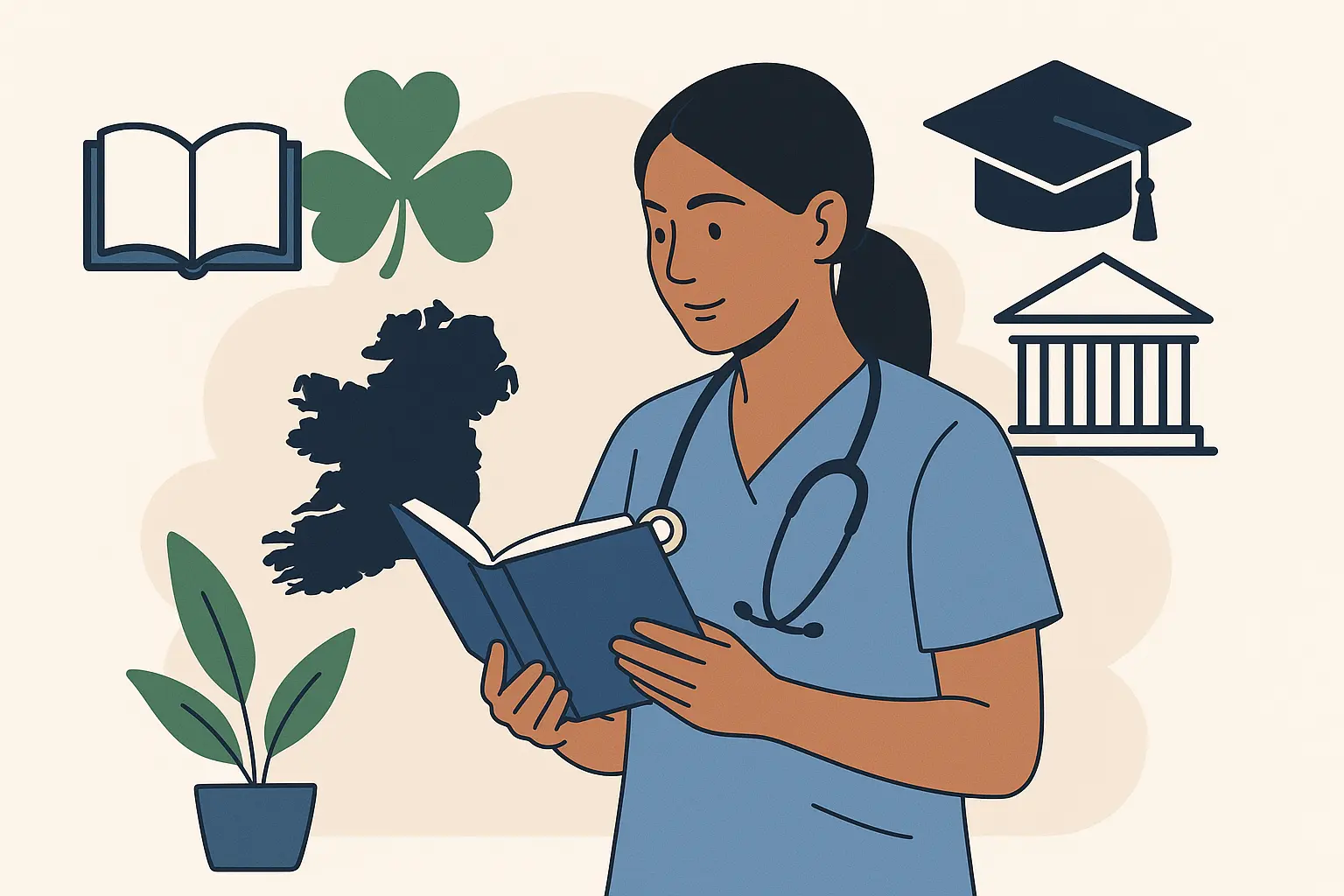
For any family moving to a new country, understanding the school system is paramount. The good news is that the Irish education system explained here is well-structured, inclusive, and offers high standards of learning. It is state-funded and accessible to all residents, providing a solid foundation for your children’s future.
The system is broadly divided into three distinct levels:
- Primary Education: This stage typically begins at age 4 or 5 and continues for eight years until around age 12. The curriculum is child-centred, focusing on literacy, numeracy, and a broad range of subjects including arts, social studies, and physical education.
- Post-Primary Education (Secondary School): Starting at age 12, this level lasts for five or six years. It consists of a three-year Junior Cycle, followed by an optional Transition Year (focused on personal and vocational development), and a two-year Senior Cycle, which culminates in the Leaving Certificate examination—the primary basis for university entry.
- Third-Level Education: This encompasses universities, technological universities, and colleges of education, offering a wide array of undergraduate and postgraduate degree programmes.
While children can start primary school at age 4, compulsory schooling officially begins at age 6 and continues until age 16, or until a student has completed three years of post-primary education. This ensures every child receives a comprehensive and foundational education. You can find a complete official overview of the system’s structure and policies online.
Key Aspects of the Irish Education System
Several core principles define the Irish education system. Primarily, it is a state-funded system, meaning tuition is free at public primary and post-primary schools. However, parents are usually asked for a voluntary contribution to cover costs for books, photocopying, and extracurricular activities. The national curriculum is standardised across the country, ensuring consistent quality, with English being the primary language of instruction in most schools. For families interested in a bilingual education, Gaelscoileanna offer full immersion in the Irish language. This system is built on a policy of parental choice, and Citizens Information provides comprehensive, up-to-date guidance on everything from school types to enrolment rights.
Finding the Right Schools in Ireland for Expats
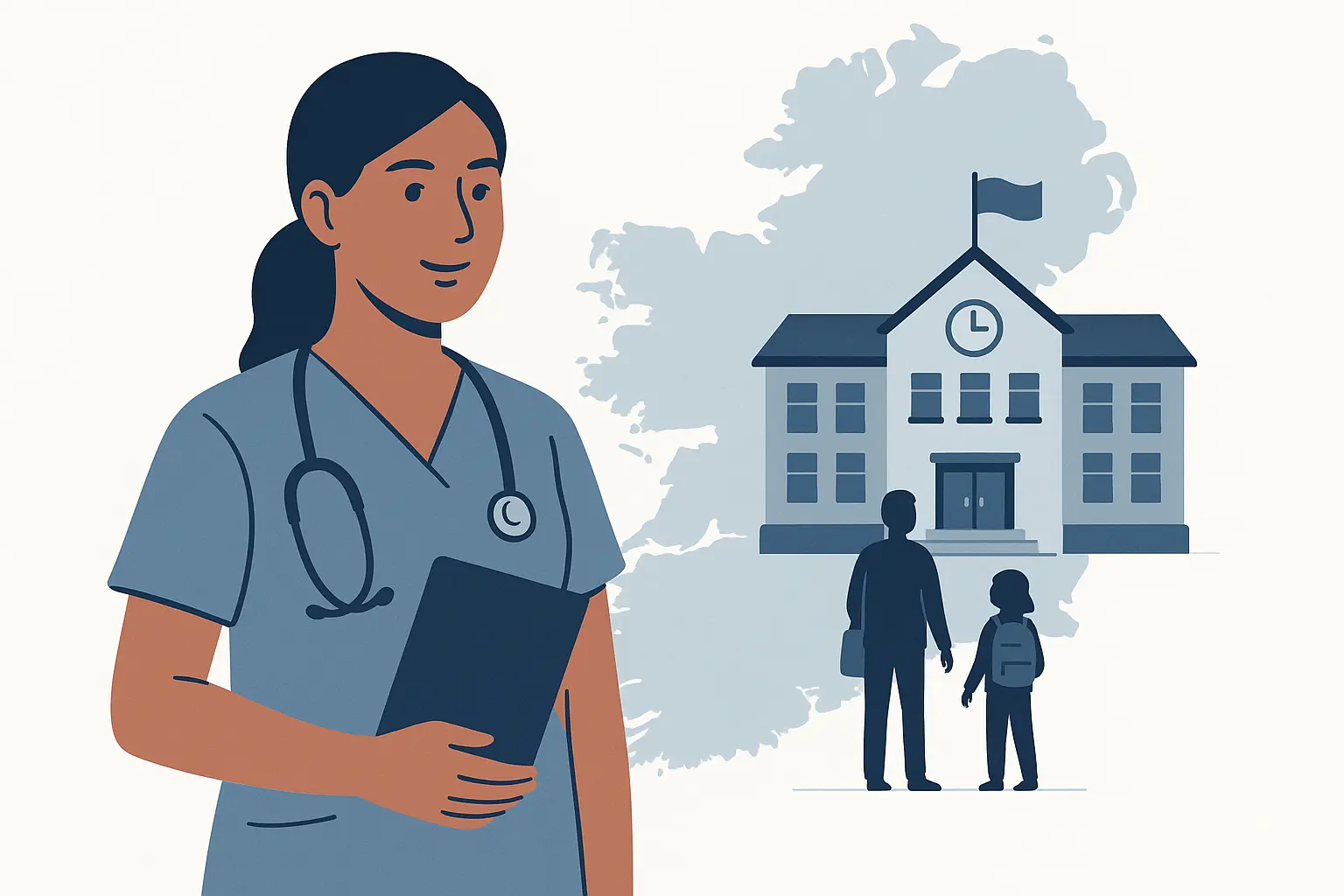
Choosing a school is one of the most significant decisions you will make for your children. Finding the right schools in Ireland for expats involves understanding the different types of schools available and navigating the enrolment process, which can differ slightly from what you are used to.
Types of Schools Available
Your main choices will be between public, private, and Irish-medium schools. Each offers a different experience, and the best fit will depend on your family’s preferences, budget, and educational philosophy.
- Public (National/Community/ETB) Schools: These are the most common type of school in Ireland and are state-funded and free to attend. At the primary level, they are often called National Schools and typically have a religious patron (though this is evolving to be more inclusive). At the secondary level, you will find Community Schools, Comprehensive Schools, and schools run by local Education and Training Boards (ETBs).
- Private/Fee-paying Schools: A smaller number of independent schools charge annual tuition fees. These private schools may offer smaller class sizes, a wider range of extracurricular activities, or follow a specific educational ethos. They are more common at the secondary level.
- Gaelscoileanna (Irish-medium schools): For families who wish for their children to become fluent in Irish, these schools are an excellent option. The entire curriculum is delivered through the Irish language, providing a deeply immersive cultural and linguistic experience.
- International Schools: While not as common as in other countries, a few international schools exist, primarily in the Dublin area. These are fee-paying and typically offer curricula like the International Baccalaureate (IB), which can be beneficial for highly mobile international families.
The Enrolment Process in Detail
Securing a place for your child requires forward planning, particularly in high-demand urban areas.
- Timelines are Crucial: Do not wait until you arrive in Ireland to start your search. It is wise to begin researching and contacting schools 6-12 months before your planned move. Applications for the main intake points—Junior Infants (age 4/5) and First Year (age 12/13)—often open and close in the autumn of the preceding year for the following September start.
- Required Documentation: When applying, you will almost always need to provide a set of standard documents. Be prepared to submit your child’s birth certificate, proof of your new address in Ireland (a utility bill or rental agreement is usually required), your child’s immunisation records, and, for older children, their previous school reports or academic transcripts.
- School Admissions Policies: Each school has its own admissions policy, which must be published on its website. This document outlines the criteria for offering places, such as sibling priority or catchment area rules. It is essential to read this carefully.
To help your children settle in, encourage them to participate in school life beyond the classroom. Sports teams, drama clubs, and music groups are fantastic ways to make friends and integrate into the school community. For additional support, school principals and local ETBs can be invaluable resources. For the most definitive information, Citizens Information offers detailed and official guidance on all aspects of school enrolment.
Navigating Childcare Costs Ireland 2025 and Options

For international nurses with younger children, understanding the childcare landscape is a top priority. Ireland offers a variety of childcare options, but it’s essential to research them thoroughly and budget for the associated expenses. While costs can be high, especially in cities, government schemes are in place to make it more affordable.
Overview of Childcare Options in Ireland
You will find a range of services to suit different needs, from full-day care for infants to pre-school programmes for toddlers.
- Creches/Day-care Centres: These are regulated facilities that provide structured care for children from infancy up to school age. They operate on a full-time or part-time basis and must be registered with Tusla, the Child and Family Agency, ensuring they meet national standards for quality and safety.
- Childminders: A childminder cares for a small group of children in their own home. This can offer a more flexible, home-like environment. It is highly recommended to choose a childminder who is registered with Tusla, as this not only provides quality assurance but is also a requirement to avail of government subsidies.
- Pre-school (ECCE Scheme): The Early Childhood Care and Education (ECCE) scheme is a universal programme providing two free years of pre-school for children. It typically starts when a child is between 2 years and 8 months and 3 years old and runs for 3 hours a day, 5 days a week, during the school term. This is an excellent way to prepare your child for primary school.
- After-school Care: For school-aged children, various after-school clubs and services are available, some run by the schools themselves and others by private providers or community groups.
Factors Influencing Childcare Costs Ireland 2025
The childcare costs Ireland 2025 will vary significantly depending on your circumstances. Key factors include:
- Location: Costs in Dublin and other major cities are considerably higher than in rural parts of the country.
- Child’s Age: Care for babies and toddlers is the most expensive due to the need for higher staff-to-child ratios.
- Hours of Care: Full-time care (8-10 hours per day) will naturally cost more than part-time or sessional care (e.g., morning sessions only).
- Type of Provider: Privately run creches may have higher fees than community-based, non-profit facilities.
Government Subsidies to Reduce Costs
The Irish government has made significant efforts to reduce the financial burden of childcare through the National Childcare Scheme (NCS). This scheme provides two types of subsidies:
- Universal Subsidy: This is available for all children under 15 using a registered childcare provider. It is not means-tested and provides a set hourly rate reduction from your fees.
- Income-Assessed Subsidy: Families who meet specific income criteria can receive a higher, means-tested subsidy. This can substantially lower your monthly childcare costs Ireland 2025.
We strongly advise all families to use the official NCS eligibility calculator on their website to see what support they are entitled to. When choosing a provider, always verify their registration with Tusla to ensure quality and eligibility for subsidies. For comprehensive details, both Citizens Information and the official NCS website offer the most reliable and official guidance on all childcare options and financial supports.
Spousal Support: Navigating the Spouse Visa Ireland Nurse Process and Employment
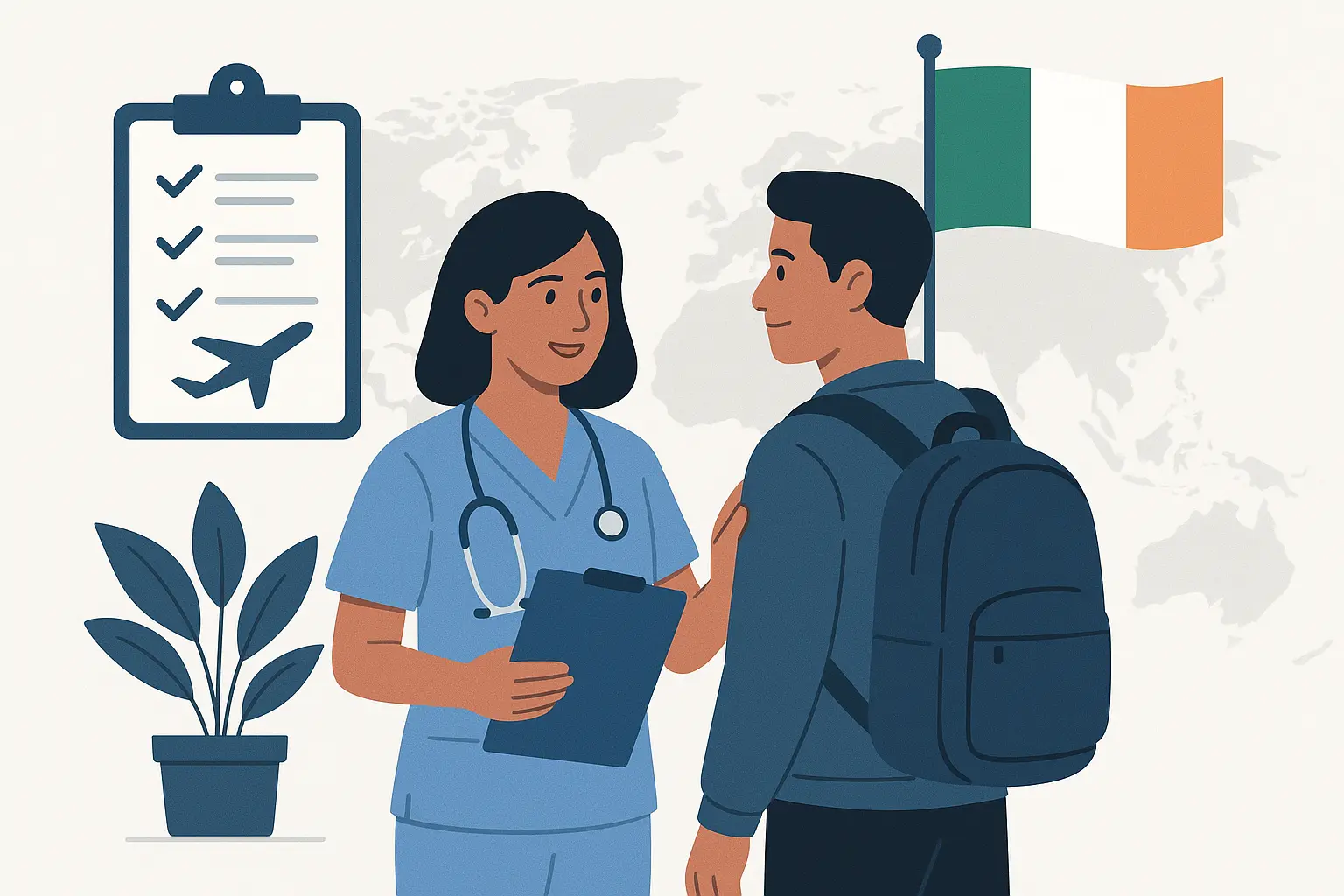
A successful family relocation hinges on ensuring every family member feels supported and has opportunities. For the accompanying partner of an international nurse, understanding visa requirements and employment prospects is critical. The spouse visa Ireland nurse process is relatively straightforward for partners of those on a Critical Skills Employment Permit.
Details on the Spouse Visa Ireland Nurse Requirements
As a nurse, you will most likely be granted a Critical Skills Employment Permit due to the high demand for your skills in the Irish healthcare system. This permit type offers significant benefits for your family.
- Eligibility Criteria: The spouse or de facto partner of a Critical Skills Employment Permit holder is eligible to join them in Ireland. Upon registration with Irish immigration authorities, they are typically granted a Stamp 1G permission on their Irish Residence Permit (IRP).
- Application Process: If your partner is from a visa-required country, they must apply for a ‘Join Family’ long-stay visa before travelling. If they are from a non-visa-required country, they can travel with you and then must register with the Garda National Immigration Bureau (GNIB) or local immigration office upon arrival to receive their residency permission.
- Necessary Documentation: Key documents for this process include a valid passport, your marriage certificate (or proof of a de facto relationship of at least two years), your official Critical Skills Employment Permit, and evidence of sufficient funds to support your family upon arrival.
Work Rights for Spouses and Partners
This is one of the most significant advantages of relocating under the Critical Skills route. Once your spouse or partner receives their Stamp 1G permission, they have the right to work in Ireland without needing to secure their own separate employment permit. This gives them immediate and unrestricted access to the Irish labour market, allowing them to pursue careers in any sector. This flexibility is a huge benefit for families relocating to Ireland with family.
Tips for Spouses Seeking Employment
To help your partner find work, here are some practical steps:
- Job Searching Resources: Start with official platforms like JobsIreland.ie, which is the government’s employment service. Supplement this with major Irish job boards (e.g., IrishJobs.ie, Indeed.ie) and connect with recruitment agencies that specialise in your partner’s field.
- Recognition of Foreign Qualifications: This is a crucial step for many professions. Advise your partner to contact the appropriate Irish regulatory body for their profession to have their foreign qualifications recognised. For example, CORU is the regulator for many health and social care professions, the Teaching Council for teachers, and Quality and Qualifications Ireland (QQI) can advise on the general academic comparability of qualifications.
- Networking: Encourage your partner to build a professional network. Joining LinkedIn groups for professionals in Ireland, attending industry events, and connecting with other expats can uncover unadvertised opportunities.
The Department of Enterprise, Trade and Employment, alongside the Irish Immigration Service, provides the most definitive and official information regarding the spouse visa, permit requirements, and associated work rights.
Settling Your Family: Beyond the Essentials
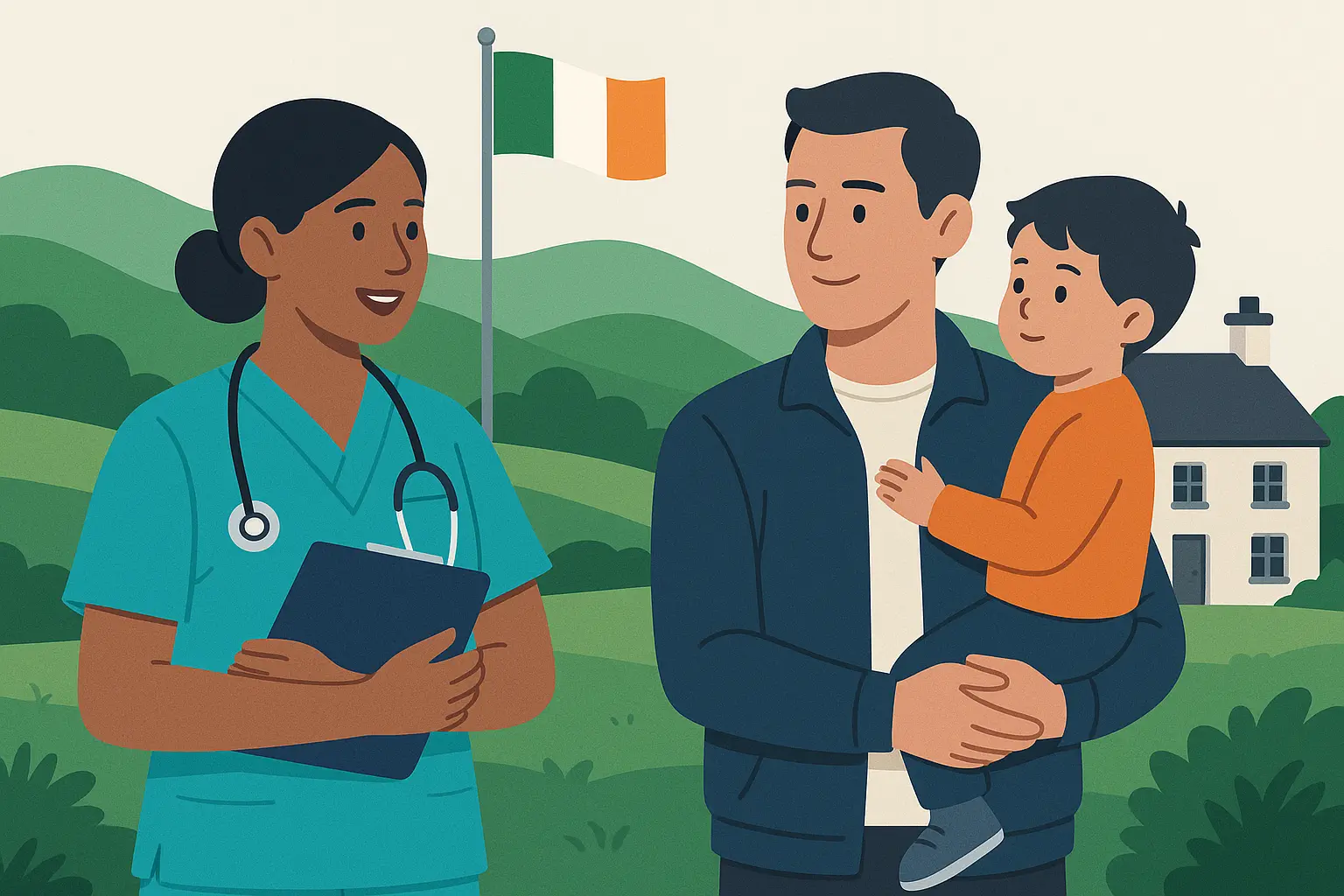
Once the major pillars of education, childcare, and employment are in place, the focus shifts to the practicalities of day-to-day life. Properly handling these details is key to a smooth and happy settlement when relocating to Ireland with family.
Accessing Healthcare for Families in Ireland
As a healthcare professional, you know the importance of a robust health system. Ireland’s public healthcare is managed by the Health Service Executive (HSE).
- Registration: One of your first steps upon arrival should be to register with the HSE. As a resident, your family will be entitled to access the public healthcare system. This includes hospital care and a range of community health services.
- GP Care: Everyone residing in Ireland is encouraged to register with a local General Practitioner (GP). You can find a list of GPs in your area on the HSE website. Importantly, there is free GP care for all children under the age of 8, with plans to extend this to age 12.
- Medical Cards and GP Visit Cards: Depending on your family’s income, you may be eligible for a Medical Card (covering all public health services for free) or a GP Visit Card (covering the cost of GP visits).
Finding Family-Friendly Accommodation
Finding the right home is essential for your family’s comfort. When searching for family-friendly accommodation, consider factors beyond the number of bedrooms. Look for properties with proximity to your chosen schools, childcare facilities, public transport links, and local amenities like parks, playgrounds, and shops. Reputable online property portals like Daft.ie and MyHome.ie are the primary resources for finding rental properties, and engaging with local letting agents can also be highly beneficial.
Community Integration for the Whole Family
True community integration helps a new country feel like home. Be proactive in building your social network.
- For Children: Enrol them in local sports clubs (Gaelic games, soccer, and rugby are hugely popular), drama groups, or music lessons. These are fantastic environments for making friends.
- For Parents: Join parent-and-toddler groups if you have young children, become a member of the local library, or participate in activities at your local community centre. These are welcoming spaces to meet other parents and neighbours.
General Practicalities
Don’t forget the essential administrative tasks:
- Banking: Open an Irish bank account as soon as possible to manage your salary and household bills. You will need proof of address and identification (your passport and Irish Residence Permit).
- Utilities: You will need to set up accounts for electricity, gas (if applicable), and broadband internet.
- Transport: Familiarise yourself with local public transport—bus, train, and the Luas tram system in Dublin. If you plan to drive, investigate the process for exchanging your foreign driving licence for an Irish one.
For all these aspects of daily life, both the HSE and Citizens Information offer extensive official guidance on everything from healthcare registration to the practicalities of living in Ireland as a family.
Your Family’s New Beginning in Ireland
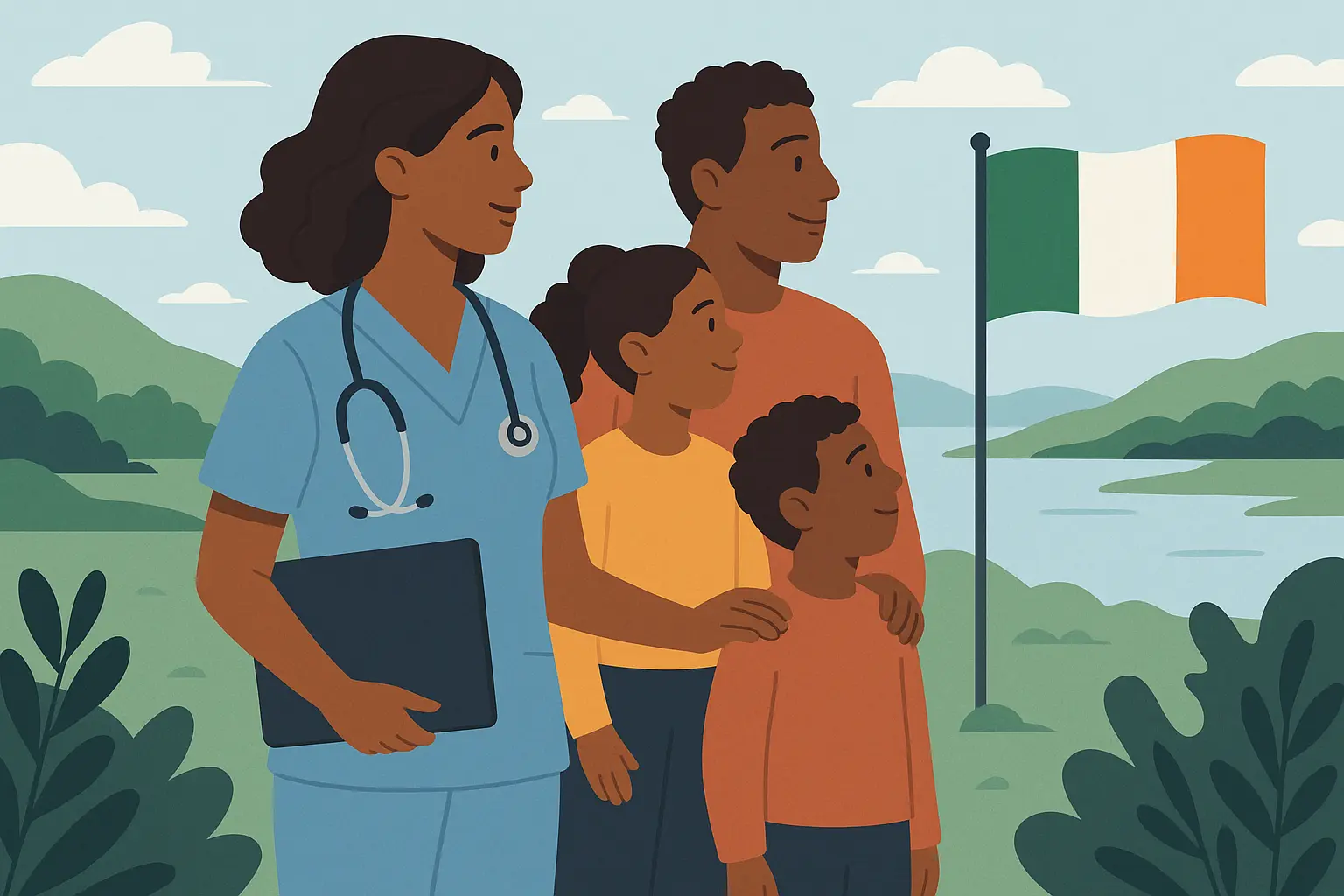
Relocating to a new country is a monumental step, but it is one filled with immense opportunity and reward. This guide has walked you through the critical pillars of a successful move: navigating the well-structured Irish education system explained, exploring the diverse schools in Ireland for expats, understanding childcare options and how to manage childcare costs Ireland 2025 with government support, and clarifying the straightforward spouse visa Ireland nurse process and the excellent work rights it affords your partner.
While relocating to Ireland with family requires careful and detailed planning, the journey is made easier by the robust support systems and welcoming communities found across the country. For you, the international nurse, and your loved ones, Ireland offers not just a job but a chance to build a rich and fulfilling life. The transition can be smooth, the communities inclusive, and the future bright.
Are you ready to take the next step? Contact us at nurse-ireland.com for personalised assistance with every aspect of your relocation. From initial queries about your nursing registration to comprehensive support with settling your family in, we are here to ensure your new beginning in Ireland is as seamless and successful as possible.
